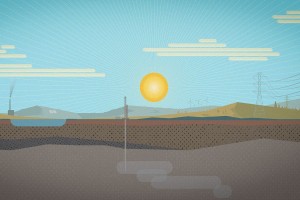.
.
From an Article posted by WVU Today, May 17, 2023
.
.
West Virginia University, a leader in energy research and innovation, is repositioning the institutes within its Research Office to best meet industry-wide transitions.
The Energy Institute will transform into the WVU Institute for Sustainability and Energy Research ( WISER), effective July 1, with Sam Taylor as its director. Taylor will build the new Institute on the foundation of the Energy Institute laid by James Wood.
Vice President for Research Fred King said the revamping of the Institute into WISER is more than just a name change.
“This restructuring is part of the University’s transformation to stay ahead of trends in the real world,” King said. “It’ll better enable us to support and engage at an R1 level when it comes to sustainability and energy transition. While it appears we are evolving, we also still want to stay true to the history and tradition of energy in the state.”
WISER will serve as the University’s coordinating institution for energy and sustainability research by collaborating with stakeholders across campus, the state and the globe to stimulate energy and environmental economic development in West Virginia and beyond.
Taylor will assume his new leadership role after serving as assistant director of strategic partnerships and technology with the Energy Institute since 2017. As director of WISER, Taylor will also oversee the National Alternative Fuels Training Consortium. In recent years, Taylor has worked with policymakers, government entities and environmental groups on pressing energy issues.
“WISER will align the talents and efforts of the Energy Institute toward a vision of sustainability, including energy, while seeking to understand and respect what that means for residents of West Virginia and the larger region,” Taylor said. “As a West Virginia native, I understand that adaptation, resilience and independence are ‘core values’ of this region, and we need to structure our work, using the capabilities of West Virginia University, to support these values. To do this effectively, we must focus on relationships.”
Taylor’s expertise covers energy development, energy geosciences including geothermal, hydrogen storage and carbon dioxide storage, transportation energy utilization, renewable and nonrenewable energy research, clean energy and advanced energy technologies.
In another restructuring move, the West Virginia Water Research Institute will shift from the Energy Institute and operate as its own entity reporting directly to the Research Office, also effective July 1.
For more than 30 years, WVWRI has focused on environmental restoration including mine land reclamation, brownfields redevelopment and watershed restoration.
WVWRI is led by Director Paul Ziemkiewicz, who has raised the profile of the group to an international level with its innovations in treating acid mine drainage and extracting rare earth elements.
Recently, a research team headed by Ziemkiewicz was awarded $8 million in U.S. Department of Energy funding to begin designing, constructing and operating a pre-commercial demonstration facility for separating and refining rare earth elements and critical minerals.
Rare earth element technologies, which power everything from smartphones to the nation’s missile guidance system, could serve as a game changer for the environment and the domestic economy.
“Since acid mine drainage is the principal pollutant in the state, we’ve devoted a lot of our attention toward making sure that agencies, citizen watershed associations and industry have the tools and policies in place to turn dead streams into recreational fisheries,” Ziemkiewicz said. “About seven years ago, with the help of the U.S. Department of Energy, we started developing a way to treat acid mine drainage while economically recovering rare earth elements and critical materials.”
With DOE support and in collaboration with the West Virginia Department of Environmental Protection, WVWRI has a full-scale demonstration facility near Mount Storm. Ziemkiewicz said he hopes to replicate that model across the country to eventually create a commercially viable rare earth supply chain that could provide the materials needed for advanced, green technologies and defense production.
“The team at WVWRI is excited about this new organizational model which will streamline relationships with the WVU administration and the faculty,” he said. “We’ve built a successful organization and generate over $6 million in research funding each year. We look forward to developing new research lines for what, arguably, is one of the nation’s premier water research institutes.”
-WVU-


{ 1 comment… read it below or add one }
WVU Energy Institute Renames Itself – Going Woke?
From the Summary in Marcellus Drilling News, May 18, 2023
We have some disappointing news to share. It appears that one of the preeminent energy research organizations in the country, the West Virginia University Energy Institute, is going woke–steering into the quicksand of focusing on unreliable, “renewable” energy.
Yesterday WVU announced that the WVU Energy Institute is changing its name to WVU Institute for Sustainability and Energy Research, effective July 1st.
It’s also getting a new director–Sam Taylor–whose research expertise is “geothermal, hydrogen storage and carbon dioxide storage, transportation energy utilization, renewable and nonrenewable energy research, clean energy and advanced energy technologies.”
There isn’t a single mention of shale or fossil energy in the entire WVU press release.
SOURCE: https://marcellusdrilling.com/2023/05/wvu-energy-institute-renames-itself-going-woke/